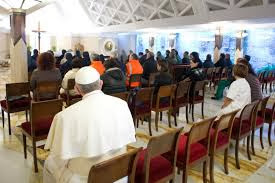Rejoice!
Gaudete Sunday tells us to rejoice - rejoice in the Lord, for He is near.
For some in the Church on what might be called the traditional side of things (for me, read simply "orthodoxy") there has, I think, been some tendency to fail a little in our rejoicing in matters papal since the election of Pope Francis. Now while some may not be rejoicing all the way to the east-facing apse, we should always rejoice in the Lord. It is the Divine Holy Spirit who protects the Successor of St Peter from leading the Church into error and He does so for this Pope as for any other.
We might rejoice that Pope Francis says this of the Council:
“the Council Fathers applied all diligence, that the Catholic faith might appear distinctly and be better perceived. Indeed, with the Holy Spirit inspiring and prompting, it concerned them chiefly that the sacred deposit of Christian doctrine not only be guarded but also shine forth more clearly, that the salvific work of the Lord be spread through the whole world and that the Gospel be extended to all the earth."
It is the Council of Trent that he is referring to:
"Heeding indeed the same Spirit, Holy Church of this age even now revives and reflects upon the most glorious Tridentine doctrine."
Quoting Pope Benedict’s 2005 address preferring a hermeneutic of reform rather than disruption, Pope Francis added, “In fact, this manner of interpreting places under a brighter light one evident property of the Church that the Lord Himself bestows on her: ‘she is clearly one ‘subject’ which, with the hastening ages, grows and is increased; nevertheless, she always remains the same. And so she is the one subject of the sojourning People of God.’”
(See here for further details.)
The FSSP Seminary in Austria - distinct lack of space!
We might rejoice that Pope Francis encourages the Priestly Fraternity of St Peter with
this message:
By way of the celebration of the sacred Mysteries according to the extraordinary form of the Roman rite and the orientations of the Constitution on the Liturgy Sacrosanctum Concilium, as well as by passing on the apostolic faith as it is presented in the Catechism of the Catholic Church, may they contribute, in fidelity to the living Tradition of the Church, to a better comprehension and implementation of the Second Vatican Council.
The Holy Father exhorts them, according to their own charism, to take an active part in the mission of the Church in the world of today, through the testimony of a holy life, a firm faith and an inventive and generous charity.
Blessed Pope John XXIII - another person who might just know a little about how to interpret the Council.
We might rejoice that Pope Francis says that
“The best hermeneutics of the Second Vatican Council” has been done by
Archbishop Agostino Marchetto - a writer who criticises the Bologna School with its interpretation of rupture in regard to the Council.
We might just rejoice that Pope Francis is open to celebrating ad orientem. Yes, I know it doesn't look like he sees it as something that we desperately need to recover but I've certainly known of bishops who seem to be terrified of being photographed standing in front of the altar, lest the liberal circle criticise them.
Perhaps the Church needs a Pope who will allow the world to get away from focusing only on the negative when it comes to the Church. It's certainly a relief to be dealing with positive attitudes in the secular press, even if they haven't understood that in this case, orthodox faith can lie beneath the polyester chasuble just as much as it can beneath one made of silk damask.
The Pope is the Pope whoever he may be.











.JPG)
.JPG)
.JPG)
.JPG)
.jpg)
.JPG)
.JPG)
.jpg)








.jpg)
.jpg)
.jpg)




















.jpg)








